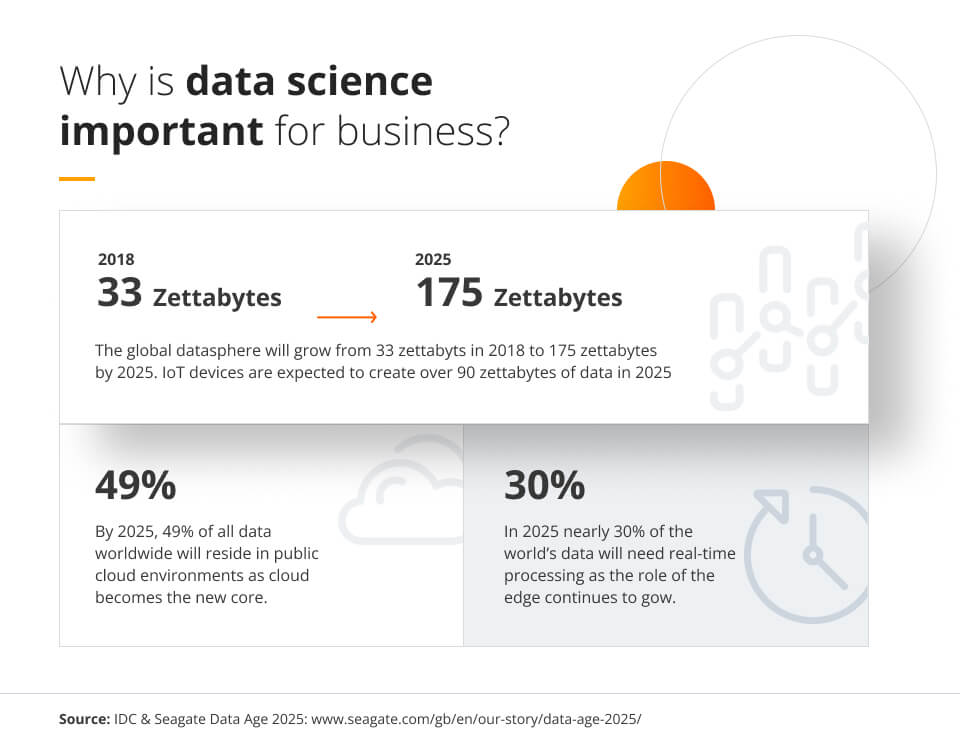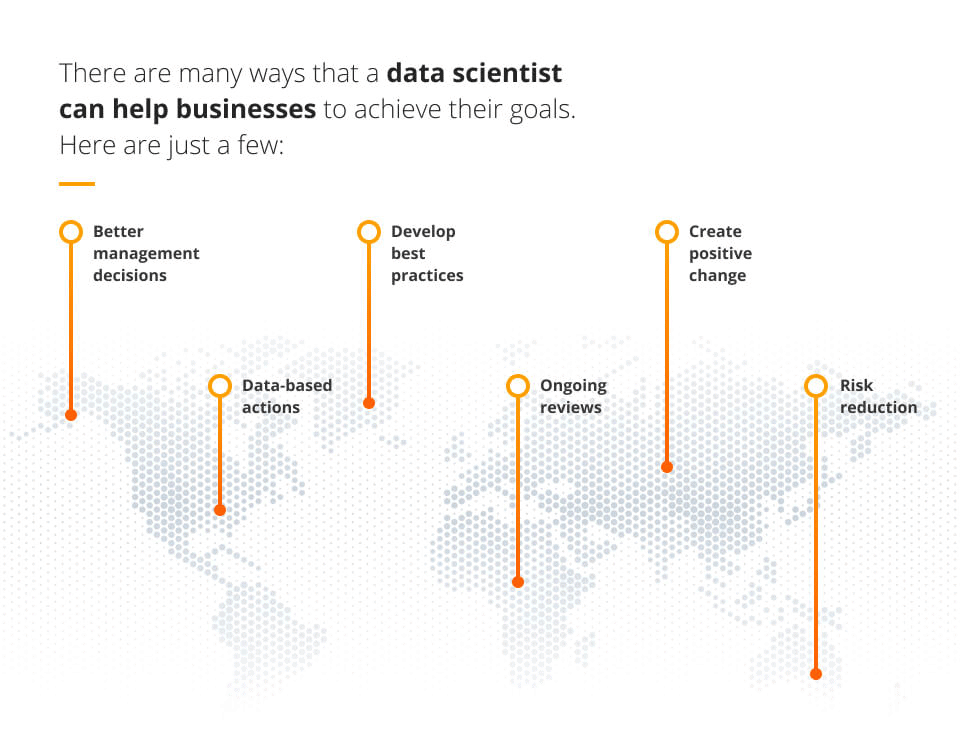
How Data Science helps businesses?
Every day, 1.7 megabytes of new data are generated for every single person on the planet - that’s a lot! We refer to this as “big data”, and it’s crucial that we understand how to organise, structure and comprehend this massive amount of information in a meaningful manner.
Data scientists are concerned with studying this data, and this highly skilled profession has never been in greater demand than it is today. By 2029, data scientists’ employment is expected to rise 15%, according to the US Bureau of Labor Statistics, which is considerably faster than the 4% average for all other occupations.
It may seem overwhelming, but the good news is that you don’t need to be a data scientist in order to work with big data. Anyone can learn how to understand and manage it, processing large amounts of data seamlessly and using it to increase their business’s efficiency and security.
Data science refers to how we collate, organise and structure these datasets in order to analyse them and extract meaning. Although similar, it is not the same as data analytics, which is concerned only with analysing and interpreting pre-existing datasets. Data science is deeper and more comprehensive than data analytics. It involves writing algorithms to form hypotheses, running experiments, assessing the quality of data, cleaning and streamlining it, and finally organising the data ready for analysis.
Why is data science important for businesses?
If one were able to store 175ZB onto BluRay discs, then you’d have a stack of discs that can get you to the moon 23 times.
Even if you could download 175ZB on today’s largest hard drive, it would take 12.5 billion drives. And as an industry, we ship a fraction of that today.David ReinselIDC Data Age 2025 Co-Author
By 2025, the IDC has predicted that the total global data will increase from its previous total of 33 zettabytes to a whopping 175 zettabytes (that’s 175 trillion gigabytes, or 175, followed by 21 zeros!).
It is clear beyond doubt that this gigantic amount of information needs to be organised and structured carefully. Data science provides us with the tools to be able to do this. It allows us to understand huge swathes of this data, to analyse it and to gain valuable insights in order to make good, data-driven decisions. Data science is not only used in IT, but across a huge range of industries including healthcare, banking, finance, marketing, engineering and much more.
Having the ability to make sense of this data is extremely important for businesses. It reduces uncertainty, allows companies to make data-driven business decisions and helps to shape good business strategies.
Companies can track and analyse trends in their markets in order to help make effective business decisions. They can use the data to help them engage their customers more effectively, to improve their company’s performance, and ultimately increase profitability. Existing data can be utilised in order to identify the company’s key audience and to target their products and services towards them.
The only way to make sense of all this data is to harness the technical know-how of data scientists in order to propel business in a modern and data-driven manner.
How can data scientists help businesses achieve their goals?
Better management decisions
A good data scientist can act as a trusted advisor to an organisation’s senior management and even be a valued strategic partner. They improve the company’s analytics capabilities significantly, communicating how previous company data can help them make informed decisions about future tasks and strategies. They help to track, measure and record performance data in order to make good, effective choices that would be harder (and much less accurate) than if the management took them without being exposed to this data.
Data-based actions
As the data scientist studies the company’s data, they are able to recommend pertinent actions to help drive their performance, engage their customers in a more meaningful manner and increase the overall profit. This helps to define the organisation’s goals, offering a good, data-driven strategy.
Develop best practices
The job of a data scientist is not to sit in a dark room surrounded by monitors, completely shut off from the world. They must engage the business’s employees and make sure that they fully understand and are on board with their company’s analytics products. Bringing the staff into the mix helps to understand the data more fully, and ultimately teaches all key personnel to utilise the data in their daily tasks to drive up performance.
Create positive change
Data scientists analyse data and are able to challenge existing processes and assumptions. This allows them to suggest developments which can be implemented to increase the performance of the company, striving to continuously improve and make adjustments based on their data.
Risk reduction
As data scientists are able to analyse the large amounts of data they have access to and make well-informed decisions, it also means that these decisions are subject to a vastly reduced degree of risk. Data scientists are able to run simulations on their models, finally coming up with a clear and rigorously tested path to meeting their company’s business goals.
Ongoing reviews
Once business decisions have been made, based on the recommendations of the data scientists, the job doesn’t stop there. A good data scientist will revisit and review previous decisions and analyse how effective they actually were. Like anything else, there’s a margin for error and there’s always a risk involved, regardless of how thoroughly the data was analysed. Understanding the true effect of previous data-driven decisions in comparison to their initial forecast helps data scientists to understand where they could improve in order to make more accurate decisions in the future.
How does data science solve business problems?
Data science can help to solve problems in many different areas of business. In particular, it is highly useful when it comes to planning and strategy, process automation, market research and recruitment.
Planning and strategy
Making good, well-informed business decisions is hard at the best of times. Will your decision pay off? What are the risks of it failing? These are key questions that are not easy to answer. Non-data science analytics can take weeks or even months to carry out. The world of business moves at lightening speed, and companies simply cannot wait for these long periods of time to pull the trigger on a decision.
Data science allows companies to make fast and effective data-driven decisions based on their performance metrics and pre-existing data. This allows companies to reduce their risk, make more well-informed decisions and increase their chances of success.
Process automation
Human labour is expensive, time-consuming and often unreliable (at least when compared to machines). Data science can help companies to identify areas of their business that can be carried out quicker and more effectively by machines instead of humans. The menial, repetitive tasks can be done by automated mechanisms, leaving humans free to work on increasing business growth.
Data science can help pick up the slack on the heavy lifting tasks, providing them with the AI-driven tools they need to carry out their jobs more effectively. It can identify weaknesses in the company and provide information on how best to improve them. Don’t get us wrong, this isn’t about “replacing” human workers, merely redistributing their talents to more value-driven tasks and responsibilities.
Market research
Big data and market research go together like white on rice. Data science can help to understand customers by highlighting key demographics, recognising patterns in the market, uncovering information relating to preferences and suggesting data-driven ways to appeal to a multitude of different customers. It can even be utilised to model vastly more accurate ROI projections for each marketing channel.
Recruitment
No matter how good your AI process automation is, humans are still at the very core of every enterprise. Excellent staff who are motivated and highly skilled in a specific industry are hard to come by, and even harder to retain.
Data science can be utilised to create machine-learning algorithms to identify relevant success factors when recruiting new staff, providing managers with the information they need to make good hiring decisions.
These models are able to quickly and effectively evaluate applications from a broad perspective and offer data on the applicant’s skills, experience, motivations, character and stress resistance.
Recruitment is often one of the biggest overheads for companies who spend huge amounts of time sourcing, interviewing and training potential candidates for their roles, only to realise down the line that they may not have chosen the ideal person. Data science helps to eliminate this risk, onboard the right people faster and ultimately end up with the best, most motivated and most suitable person for the role.
Summary
The benefits of working with data scientists to understand, analyse and action big data are clear. They can help streamline a company’s processes, reduce risk and overheads, make more well-informed decisions and ultimately, increase profits.
Many companies both large and small are adopting a data science approach to their operations, and this trend is only set to continue as we move forward into the future.







